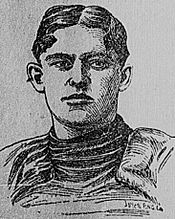Bradley Walker
Bradley Walker | |
|---|---|
 Walker depicted c. 1900 | |
| Born | October 14, 1877 |
| Died | February 3, 1951 (aged 73) |
| Occupation | Attorney |
| College football career | |
| Virginia Cavaliers | |
| Position | Fullback/Tackle |
| Class | 1902 |
| Personal information | |
| Weight | 198 lb (90 kg) |
| Career history | |
| College | Virginia (1900–1901) |
| Career highlights and awards | |
| |
Bradley Walker (October 14, 1877 – February 3, 1951) was a celebrated southern college football player and official as well an attorney.[1][2] The Palm of Alpha Tau Omega called Walker "one of the all-time greats in Southern athletic history."[3]
Early years
Bradley Walker was born on October 14, 1877 in Columbia, Tennessee to William Overton Walker and Alice Cabler.[2] His father was a farmer and a lumberman. Walker graduated as a licensed instructor from Peabody College in 1897, received his bachelors in 1898 from the University of Nashville, and his LL.B. at the University of Virginia in 1902.[2]
University of Virginia
Walker starred in football, baseball, and track at the University of Virginia.[2] He later also played tennis and golf.[2][4]
Football
Walker was a prominent fullback and tackle for the Virginia Cavaliers.
1900
Virginia in 1900 was Southern champion and gave the Sewanee Tigers their first defeat since 1897 by a score of 17 to 5. One account of the Sewanee game reads "Bradley Walker, full-back, is the strongest and heaviest player on the team."[5] In the game against the Carlisle Indians he grabbed Hawley Pierce, Carlisle's biggest player, and carried him ten yards with him dangling over his shoulder.[5][6]
1901
The Cavaliers repeated as Southern champion. Walker was selected All-Southern in 1901.[7] Caspar Whitney ranked him as perhaps the best player in the south, but said he had been playing football for more than four years if one were to include his time teaching at St. Albans in Radford, and so did not pick him.[8] The Virginia faithful objected this was not a common reason to rule one ineligible.[9]
Official
Walker officiated many southern football contests,[4] including the Michigan–Vanderbilt series.[10][11]
Nashville Vols
Walker was president[12] of the trustees in the joint stock company which owned the Nashville Vols baseball club from 1905 to 1907.[13] The company's goal was to sell 100 shares of stock at $100 per share to raise $10,000. Never reaching this goal, the owners cut corners to remain solvent, selling the team by the end of 1907.[13]
Law career
From 1906 until the close of his life he practiced law in Nashville.[2] For thirty years he was an attorney for the Peabody College.[2][14]
He was secretary of the Nashville Park Board from 1902 to 1910, and during 1940–42 was chairman of the Red Cross drive in Nashville.[2]
Personal life
Walker was a methodist, and politically a democrat.[2]
References
- ^ W. R. Tichenor (December 3, 1905). "Football Experts Give Their Selections For An All-Southern Team". The Atlanta Constitution.
- ^ a b c d e f g h i "Walker, Bradley". The National cyclopaedia of American biography. 40: 354.
- ^ "Nashville". The Palm of Alpha Tau Omega. 70 (2): 47. 1950.
- ^ a b "Trying Out Golf Course". The Evening Independent. September 27, 1922.
- ^ a b "Virginia vs. Sewanee". Richmond Dispatch. November 25, 1900.
- ^ "There's No Place Like Virginia, They Say". Saturday Evening Post. 224 (12): 30. September 1951.
- ^ ""All Southern" Eleven". The State. February 7, 1902.
- ^ "Southern Intercollegiate Football". Outing. 37: 726.
- ^ "College Gossip In Old Virginia". The Times. March 16, 1902. p. 14. Retrieved March 27, 2015 – via Newspapers.com.

- ^ Edwin Lillie Miller. Practical English Composition. Vol. 2. p. 56.
- ^ "Michigan 9; Vanderbilt, 8". The Michigan Alumnus. 18: 68.
- ^ "On This Date".
- ^ a b John A. Simpson. The Greatest Game Ever Played In Dixie. p. 32.
- ^ "OF THE BOARD OF DIRECTORS OF SOUTHWESTERN REIDIN THE DIRECTORS' ROOM A1R IN PATJ HALL". February 4, 1930.
- 1877 births
- 1951 deaths
- American football fullbacks
- American football punters
- American football tackles
- College football officials
- Virginia Cavaliers football players
- All-Southern college football players
- University of Nashville alumni
- University of Virginia School of Law alumni
- Peabody College alumni
- Democrats (United States)
- People from Columbia, Tennessee
- Sportspeople from Nashville, Tennessee
- Players of American football from Tennessee
- American Methodists
